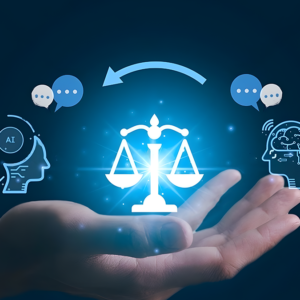The integration of Artificial Intelligence (AI) into our daily lives has brought about immense innovation and efficiency, but it also poses significant challenges, particularly in the realm of data privacy. As AI systems rely heavily on data to learn and improve, the collection, storage, and use of this data have become critical points of discussion, highlighting the need for artificial intelligence data protection and machine learning privacy measures.
Given the importance of balancing innovation with consumer protection, it is essential to address the delicate relationship between AI development and data privacy. The increasing use of AI in various sectors has raised concerns about AI & Data Privacy, emphasizing the need for regulations and ethical practices to ensure consumer security without stifling innovation.
Introduction to AI and Data Privacy
As we move forward, it is crucial to prioritize AI & Data Privacy, implementing effective machine learning privacy measures to safeguard consumer information. By exploring the current landscape and challenges in AI and data privacy, we can work towards a future where innovation and consumer protection coexist in harmony, ensuring the responsible use of artificial intelligence data protection.
Key Takeaways
- AI development relies heavily on data, raising concerns about data privacy and the need for artificial intelligence data protection.
- Machine learning privacy measures are essential to safeguard consumer information and ensure AI & Data Privacy.
- Regulations and ethical practices are necessary to balance innovation with consumer protection.
- Effective implementation of AI & Data Privacy measures can ensure consumer security without stifling innovation.
- Prioritizing AI & Data Privacy is crucial for the responsible use of artificial intelligence data protection.
- Collaboration and education are key to addressing the challenges in AI and data privacy.
Understanding AI and its Implications for Data Privacy
Artificial Intelligence (AI) has become an integral part of our daily lives, from virtual assistants to personalized product recommendations. To grasp the implications of AI on data privacy, it’s essential to understand the basics of AI and its data usage. AI systems are designed to perform tasks that typically require human intelligence, such as learning, problem-solving, and decision-making, all of which rely on data.
The role of data in AI training is pivotal, as it determines the accuracy and reliability of AI decisions. Data security AI solutions are crucial in ensuring the protection of sensitive information. Moreover, privacy compliance algorithms must be implemented to adhere to regulatory requirements. AI governance regulations also play a vital role in overseeing the development and deployment of AI systems.
Some key aspects of AI and data privacy include:
- AI systems collect and process vast amounts of data, which can be sensitive and personal.
- Data is used to train AI models, making them more accurate and reliable.
- AI governance regulations are essential to ensure that AI systems are developed and deployed responsibly.
By understanding how AI collects and uses data, we can better appreciate the need for robust data security AI solutions and privacy compliance algorithms. As AI continues to evolve, it’s crucial to prioritize AI governance regulations to protect consumer data and maintain trust in AI systems.
Key Data Privacy Regulations in the U.S.
The regulatory landscape for data privacy in the U.S. is evolving, with significant influences from international regulations and domestic laws. Companies involved in AI development must understand these regulations to ensure compliance and build trust with consumers. Ethical AI privacy practices are crucial in this context, as they involve safeguarding data in AI technologies to prevent misuse and protect user privacy.
Some key regulations include:
- The General Data Protection Regulation (GDPR), which has set a high standard for data protection globally
- The California Consumer Privacy Act (CCPA), a domestic law that emphasizes transparency, consent, and accountability in data collection and use
These regulations have far-reaching implications for AI development, as they require companies to prioritize ethical AI privacy practices and ensure that safeguarding data in AI technologies is a core aspect of their operations. By doing so, companies can not only comply with regulatory requirements but also build trust with consumers and establish themselves as responsible stewards of user data.
As the regulatory landscape continues to evolve, it is essential for companies to stay informed about upcoming changes and adapt their ethical AI privacy practices accordingly. This may involve implementing new measures for safeguarding data in AI technologies, such as enhanced encryption methods or more transparent data collection practices.
The Importance of Consumer Trust in AI
Consumer trust is a cornerstone of successful AI integration, and this section explores how trust can be built and maintained. As AI technologies continue to evolve, it’s essential to prioritize artificial intelligence data protection to ensure the sensitive information of consumers is safeguarded. The impact of data breaches on consumer trust cannot be overstated, highlighting the need for transparency and robust data protection measures.
To build trust, companies must be proactive in their approach, including clear communication about data use and adherence to AI & Data Privacy regulations. Some key strategies for building trust include:
- Implementing robust security measures to prevent data breaches
- Providing transparent information about data collection and use
- Offering consumers control over their personal data
By prioritizing consumer trust and AI & Data Privacy, companies can establish a strong foundation for the successful integration of AI technologies. As the use of AI continues to grow, it’s essential to prioritize artificial intelligence data protection to maintain consumer trust and ensure the long-term success of these technologies.
The Challenges of Data Privacy in AI Development
As AI systems become increasingly prevalent, the need to address data privacy concerns has never been more pressing. The development of AI systems poses unique challenges, including the risk of data misuse and the presence of bias in AI decisions. To mitigate these risks, it’s essential to implement machine learning privacy measures that prioritize data protection and transparency.
One of the primary challenges in AI development is balancing innovation with privacy considerations in AI development. AI systems, particularly those based on machine learning, require vast amounts of data to operate effectively, which poses risks of data misuse. To address this, developers must carefully consider data sources, robust testing for bias, and the implementation of privacy measures from the outset of AI development.
Some key strategies for addressing data privacy concerns in AI development include:
- Implementing robust data governance policies
- Conducting regular audits and compliance checks
- Providing transparency into AI decision-making processes
By prioritizing data privacy and implementing effective machine learning privacy measures, developers can help build trust with consumers and ensure that AI systems are used in a responsible and ethical manner. This requires careful consideration of privacy considerations in AI development and a commitment to transparency and accountability.
Best Practices for Companies Utilizing AI
As companies increasingly adopt AI technologies, it’s essential to prioritize ethical AI privacy practices to maintain consumer trust and comply with AI governance regulations. Implementing strong data governance policies is crucial to ensure that data is collected, used, and protected responsibly. This includes establishing clear guidelines for data handling, storage, and sharing, as well as ensuring that employees understand their roles and responsibilities in maintaining data privacy.
To achieve this, companies can take several steps, including:
- Developing and enforcing robust data governance policies
- Providing regular training for employees on data privacy and security best practices
- Conducting regular audits and compliance checks to identify vulnerabilities and ensure alignment with regulatory requirements
By adopting these best practices, companies can demonstrate their commitment to ethical AI privacy practices and maintain the trust of their customers. This, in turn, can help to build a positive reputation and drive long-term success. As the use of AI continues to evolve, it’s essential for companies to stay up-to-date with the latest AI governance regulations and to prioritize transparency and accountability in their AI development and deployment practices.
| Best Practice | Description |
|---|---|
| Data Governance Policies | Establish clear guidelines for data handling, storage, and sharing |
| Employee Training | Provide regular training on data privacy and security best practices |
| Regular Audits | Conduct regular audits and compliance checks to identify vulnerabilities |
How AI Can Enhance Data Privacy
As we continue to navigate the complex relationship between AI and data privacy, it’s essential to explore the potential of AI in enhancing data privacy. By leveraging data security AI solutions, organizations can protect sensitive information from unauthorized access. One of the primary ways AI can enhance data privacy is by detecting threats in real-time, providing an early warning system for potential data breaches.
AI can also be used in data anonymization techniques, making it more difficult for unauthorized parties to access personal data. This is particularly important in industries where sensitive information is handled regularly, such as healthcare and finance. Furthermore, AI can automate compliance with privacy compliance algorithms, reducing the risk of human error and ensuring that data handling practices are consistently aligned with legal and ethical standards.
Some of the key benefits of using AI to enhance data privacy include:
- Improved threat detection and response
- Enhanced data anonymization and encryption
- Automated compliance with data regulations
By implementing these data security AI solutions and privacy compliance algorithms, organizations can ensure that they are taking a proactive approach to protecting sensitive information and maintaining the trust of their customers. As the use of AI continues to evolve, it’s likely that we’ll see even more innovative solutions for enhancing data privacy and protecting against potential threats.
The Role of Consumers in AI Data Privacy
As consumers, we play a vital role in protecting our data privacy, and it’s essential to understand how artificial intelligence data protection works. With the increasing use of AI & Data Privacy technologies, consumers must be aware of their rights and take control of their data. The concept of AI & Data Privacy is not just about protecting personal information, but also about ensuring that consumers are empowered to make informed decisions about their data.
Consumers have the right to understand how their data is used and to manage their privacy settings effectively. This includes being aware of the tools available for managing privacy settings, such as opting out of data collection or customizing data sharing preferences. By taking an active role in managing their data, consumers can help prevent data breaches and ensure that their personal information is protected.
Empowering Consumers through Education
Education is key to empowering consumers to take control of their data privacy. By understanding how AI & Data Privacy technologies work, consumers can make better decisions about the services they use and the data they share. Some ways to empower consumers include:
- Providing clear and concise information about data collection and use
- Offering tools and resources to manage privacy settings
- Encouraging transparency and accountability in AI & Data Privacy practices
By working together, consumers, companies, and regulators can ensure that AI & Data Privacy technologies are used in a way that respects and protects consumer rights. As we move forward in this era of artificial intelligence data protection, it’s essential to prioritize consumer education and empowerment.
Future Trends in AI and Data Privacy
As we look to the future, it’s clear that advancements in machine learning privacy measures will play a significant role in shaping the landscape of AI and data privacy. With the increasing importance of privacy considerations in AI development, companies are now prioritizing data protection from the outset. This shift towards privacy-focused AI technologies is expected to drive innovation and growth in the industry.
The future of AI and data privacy is likely to be shaped by regulatory changes, with predictions suggesting stricter data privacy laws and more stringent compliance requirements. As AI continues to advance, it could significantly shape the future of privacy, potentially leading to more personalized and secure data handling practices. Some key trends to watch include:
- Increased adoption of privacy-focused AI technologies
- Stricter regulatory requirements for data privacy
- Growing importance of transparency and accountability in AI development
By prioritizing machine learning privacy measures and privacy considerations in AI development, companies can ensure that their AI systems are aligned with societal values and ethical standards. As the industry continues to evolve, it’s essential to strike a balance between innovation and data protection, ultimately creating a more secure and trustworthy AI ecosystem.
Conclusion: Finding the Balance
The journey to balance innovation with consumer protection in the realm of ethical AI privacy practices is an ongoing conversation. It requires collaboration between the innovators developing AI technologies and the regulators tasked with safeguarding our data. As a consumer, your role is vital in this process.
By staying informed and supporting AI practices that prioritize data privacy, you can drive demand for solutions that enhance our lives without compromising our personal information. Together, we can shape a future where the wonders of AI are seamlessly integrated with robust data privacy safeguards.
The path forward may not be simple, but through open dialogue and a commitment to ethical AI development, we can find the balance that allows innovation to thrive while protecting the privacy of individuals. Your active participation in this ongoing conversation is key to realizing this vision.














